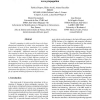Free Online Productivity Tools
i2Speak
i2Symbol
i2OCR
iTex2Img
iWeb2Print
iWeb2Shot
i2Type
iPdf2Split
iPdf2Merge
i2Bopomofo
i2Arabic
i2Style
i2Image
i2PDF
iLatex2Rtf
Sci2ools
128
Voted
CSE
2008
IEEE
2008
IEEE
Exploiting Intensive Multithreading for the Efficient Simulation of 3D Seismic Wave Propagation
Parallel computing is widely used for large scale threedimensional simulation of seismic wave propagation. One particularity of most of these simulations is to consider a finite computing domain whereas the physical problem is unbounded. Additional numerical conditions are then required to absorb the energy at the artificial boundaries, which introduces a different formulation and a loadimbalance. In the context of finite difference method, we study the use of thread overloading approach to alleviate the imbalance. We introduce a mixed-hybrid parallel implementation based on a classical cartesian partitioning at the MPI level and a self-scheduling algorithm at the thread level to handle more than 700 threads on 8 processors. We demonstrate the efficiency of our methodology on an example of regional modeling performed on 80 processors.
CSE 2008 | Scale Threedimensional Simulation | Seismic Wave Propagation | Theoretical Computer Science | Thread Overloading Approach |
| Added | 19 Oct 2010 |
| Updated | 19 Oct 2010 |
| Type | Conference |
| Year | 2008 |
| Where | CSE |
| Authors | Fabrice Dupros, Hideo Aochi, Ariane Ducellier, Dimitri Komatitsch, Jean Roman |
Comments (0)

